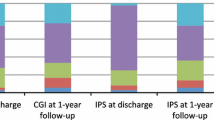Abstract
In 1975 Jennett and Bond published an account of a Global Outcome Scale which they developed for use in the assessment of individuals who have had head injuries. The Scale has been used widely in several contries including Britain, Holland, and the United States, and familiarity with it has brought several criticisms. The main ones are, first, that it is a crude measure and not sensitive to subtle changes in patients’ status and, second, that there is little background information about the nature and extent of physical and mental handicaps which make up the first three elements of the Scale. In other words, we wish to know what constitutes good recovery, moderate disability and severe disability. Jennett and others (1978) accept the first of these criticisms, and in a response to it have expanded the categories mentioned above from three to six thereby giving increased sensitivity. In order to deal with the second criticism a careful study of the mental and physical deficits of two groups of brain injured individuals has been carried out. Four kinds of disability have been examined. In a first sample of 150 patients physical, cognitive, and personality deficits have been graded as nil, mild, moderate, or severe, and related to outcome at six months after injury by which time most of these deficits are established. In a second sample, which is still under study, in addition to the deficits examined in the first group, the social consequences of disability are being examined in detail. Results from the first study show that some deficits, albeit mild, were detectable in 97% of the patients examined. Two-thirds had personality change, two-thirds had cognitive change, and 93% had one or other of both of these mental deficits. Physical handicaps were present in 75% of patients, but were less significant than mental handicaps which dominated recovery in just over half the patients in the survey. This pattern was repeated in each of the three outcome categories examined. In more detail, in 30% of patients the only detectable deficit was a change in personality, a figure which increased to 60% in patients without physical deficits or one of only a mild degree, and to a similar extent in those with nil or mild cognitive deficits.
Access this chapter
Tax calculation will be finalised at checkout
Purchases are for personal use only
Similar content being viewed by others
Author information
Authors and Affiliations
Editor information
Editors and Affiliations
Rights and permissions
Copyright information
© 1979 Springer-Verlag Wien
About this paper
Cite this paper
Bond, M.R., Jennett, W.B., Brooks, D.N., McKinlay, W. (1979). The Nature of Physical, Mental and Social Deficits Contributing to the Categories of Good Recovery, Moderate and Severe Disability in the Glasgow Global Outcome Scale. In: Brihaye, J., et al. Proceedings of the 6th European Congress of Neurosurgery. Acta Neurochirurgica, vol 28. Springer, Vienna. https://doi.org/10.1007/978-3-7091-4088-8_29
Download citation
DOI: https://doi.org/10.1007/978-3-7091-4088-8_29
Publisher Name: Springer, Vienna
Print ISBN: 978-3-7091-4090-1
Online ISBN: 978-3-7091-4088-8
eBook Packages: Springer Book Archive




